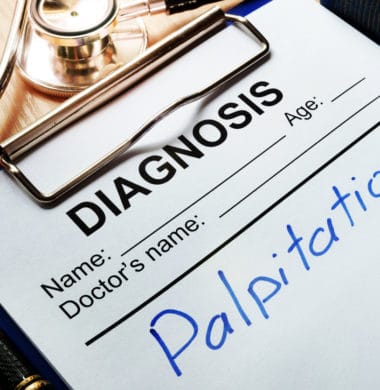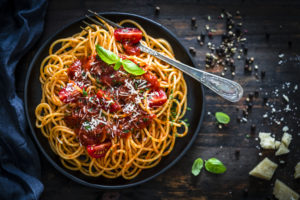Why Do I Get Heart Palpitations after Eating?

Heart palpitations can be frightening. In some instances, they may be a sign of a serious heart-related medical issue, which is why it’s common to be alarmed when you experience them. However, heart palpitations are often relatively benign and shouldn’t necessarily be a cause for concern. This is often true when they occur after eating.
It’s common to feel like your heart is beating too rapidly or irregularly when you experience palpitations. While the actual symptoms differ for everyone, heart palpitations typically result in:
- A feeling like your heart is skipping a beat
- A pounding or throbbing sensation that feels like your heart is beating too hard
- A fluttering sensation in your chest
- A racing heartbeat
Keep in mind that there are many potential causes of heart palpitations and when they occur after eating, it’s likely that they may be associated with your diet. Paying attention to what you eat can help you identify the potential cause of your palpitations.
Foods that May Cause Heart Palpitations
Certain foods, beverages, and supplements are commonly associated with heart palpitations. By limiting your consumption of these items, you may be able to reduce the likelihood of experiencing this uncomfortable and frightening issue after meals.
Excess Caffeine
If you can’t function without your morning coffee, you’re not alone. Many people need that burst of caffeine to get their day going. A 2016 study published by the Journal of the American Heart Association found that there is no correlation between moderate caffeine consumption and heart palpitations. If you only have one or two cups of coffee to start your day, it’s unlikely that this will cause you to experience palpitations. However, excessive caffeine consumption may potentially trigger this undesirable reaction in your heart.
Not only is caffeine a stimulant, which can cause your heart to race, but it’s also a diuretic. Diuretics can result in dehydration, which may cause palpitations. If you’re drinking a lot of coffee, make sure to supplement it with plenty of water to ensure you stay properly hydrated.
Alcohol
It’s common to enjoy a few drinks with a meal, especially in social situations. However, these cocktails may be impacting your heart. A study conducted at the University of California San Francisco found that alcohol consumption can cause heart palpitations in people with atrial fibrillation or cardiac arrhythmia.
If you’re a heavy drinker and experience palpitations, you may want to reduce your alcohol consumption. It’s possible this will correct the issue.
Foods High in Carbohydrates and Sugar

Supplements
Certain dietary supplements can affect your heart rate if taken before or after eating. These include:
- Bitter orange
- Ginseng
- Ephedra
- Valerian
- Hawthorn
Individual Food Allergies
Food allergies are very common. Often, the nature and severity of the allergy will dictate the way you’re affected. In some instances, these allergic reactions may cause heart palpitations.
Monitor Your Diet
If you find that you’re experiencing heart palpitations after meals, you should start paying attention to what you’re eating and the quantities you’re consuming. Keeping a food diary can help you identify potential items in your diet that may be triggering these palpitations.
Make sure you log the following information in your food diary:
- The specific foods and beverages you’re consuming, including the quantity
- The time of day you consumed these items
- How you feel after the meal or snack, including whether you developed heart palpitations
This record of your diet can help identify connections between specific foods and heart palpitations. Pay specific attention to how you feel after consuming substances that are commonly associated with this condition. If you notice that you’re consistently consuming certain foods and beverages when you get palpitations, consider phasing these items out of your diet to see if it reduces the frequency of these incidents.
Learn More About Heart Palpitations
When Should I See a Doctor?
While you shouldn’t ignore heart palpitations, they don’t necessarily need to be cause for alarm. This is especially true if they’re mainly occurring after eating. However, you should pay attention to their frequency. If you find they’re occurring regularly, you may want to speak to your doctor.
In addition, you should always seek medical attention if you experience the following symptoms in conjunction with heart palpitations:
- Difficulty breathing
- Chest pain
- Dizziness
- Fainting
South Denver Cardiology Associates Can Help
At South Denver Cardiology Associates, our team of cardiologists can help you identify the cause of your heart palpitations. We use the latest and most advanced diagnostic testing technology to gather the data necessary to determine whether your palpitations are cause for concern. If the issue is being caused by your diet, we can make recommendations that will help you alter your lifestyle to alleviate the problem.
Please contact South Denver Cardiology Associates today to schedule an appointment. We serve patients in Denver, Littleton and the surrounding areas of Colorado.
- 9 Tips to Reduce Holiday Stress - December 11, 2025
- 6 Tips for Exercising Outdoors with a Heart Condition - May 19, 2025
- Lifestyle Changes That Can Help Manage Arrhythmia - April 30, 2025
Sign Up
As with any health concerns, your specific treatment program should be discussed thoroughly with your primary care physician as well as any specialists who may need to be consulted – like a cardiologist.
Sign Up
